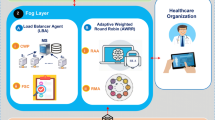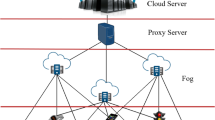Abstract
The rapid development of internet of things (IoT) gadgets and the increase in the rate of sending requests from these devices to cloud data centers resulted in congestion and consequently service provisioning delays in the cloud data centers. Accordingly, fog computing emerged as a new computing model to address this challenge. In fogging, services are provisioned at the edge of the network using devices with computing and storage capabilities, which are located through the way to connect IoT devices to cloud data centers. Fog computing aims to alleviate the computing load in data centers and cut the delay of requests down, notably real-time and delay-sensitive requests. To achieve these goals, vitally important challenges such as scheduling requests, balancing the load, and reducing energy consumption, which affects performance and reliability in the edge-fog-cloud computing architecture, should be considered into account. In this paper, a reinforcement learning fog scheduling algorithm is proposed to address these challenges. The experimental results indicate that the proposed algorithm raises the load balance and diminishes the response time compared to the existing scheduling algorithms. Additionally, the proposed algorithm outperforms other approaches in terms of the number of used devices.






Similar content being viewed by others
Notes
Available at https://www.cs.huji.ac.il/labs/parallel/workload/l_lcg/.
References
Doryanizadeh V, Keshavarzi A, Derikvand T, Bohlouli M (2021) Energy efficient cluster head selection in internet of things using minimum spanning tree (eemst). Appl Artif Intell 35(15):1777–1802
Sarrafzade N, Entezari-Maleki R, Sousa L (2022) A genetic-based approach for service placement in fog computing. J Supercomput 78(8):10854–10875
Keshavarzi A, Haghighat AT, Bohlouli M (2021) Clustering of large scale qos time series data in federated clouds using improved variable chromosome length genetic algorithm (cqga). Expert Syst Appl 164:113840
Alqahtani F, Amoon M, Nasr AA (2021) Reliable scheduling and load balancing for requests in cloud-fog computing. Peer-to-Peer Netw Appl 14(4):1905–1916
Madhura R, Elizabeth BL, Uthariaraj VR (2021) An improved list-based task scheduling algorithm for fog computing environment. Computing 103(7):1353–1389
Azizi S, Shojafar M, Abawajy J, Buyya R (2022) Deadline-aware and energy-efficient iot task scheduling in fog computing systems: a semi-greedy approach. J Netw Comput Appl 201:103333
Khan T, Tian W, Zhou G, Ilager S, Gong M, Buyya R (2022) Machine learning (ml)-centric resource management in cloud computing: a review and future directions. J Netw Comput Appl 66:103405
Hosseinioun P, Kheirabadi M, Tabbakh SRK, Ghaemi R (2020) A new energy-aware tasks scheduling approach in fog computing using hybrid meta-heuristic algorithm. J Parallel Distrib Comput 143:88–96
Ghasemi A, Toroghi Haghighat A (2020) A multi-objective load balancing algorithm for virtual machine placement in cloud data centers based on machine learning. Computing 102(9):2049–2072
Abdel-Basset M, Mohamed R, Chakrabortty RK, Ryan MJ (2021) Iega: an improved elitism-based genetic algorithm for task scheduling problem in fog computing. Int J Intell Syst 36(9):4592–4631
Fellir F, El Attar A, Nafil K, Chung L (2020) A multi-agent based model for task scheduling in cloud-fog computing platform. In: 2020 IEEE international conference on informatics, IoT, and enabling technologies (ICIoT). IEEE, pp 377–382
Binh HTT, Anh TT, Son DB, Duc PA, Nguyen BM (2018) An evolutionary algorithm for solving task scheduling problem in cloud-fog computing environment. In: Proceedings of the ninth international symposium on information and communication technology, pp 397–404
Bian S, Huang X, Shao Z (2019) Online task scheduling for fog computing with multi-resource fairness. In: 2019 IEEE 90th vehicular technology conference (VTC2019-Fall). IEEE, pp 1–5
Ghanavati S, Abawajy J, Izadi D (2020) Automata-based dynamic fault tolerant task scheduling approach in fog computing. IEEE Trans Emerg Top Comput 6:66
Sun Y, Lin F, Xu H (2018) Multi-objective optimization of resource scheduling in fog computing using an improved nsga-ii. Wirel Pers Commun 102(2):1369–1385
Tan H, Chen W, Qin L, Zhu J, Huang H (2020) Energy-aware and deadline-constrained task scheduling in fog computing systems. In: 2020 15th International conference on computer science & education (ICCSE). IEEE, pp 663–668
Wan J, Chen B, Wang S, Xia M, Li D, Liu C (2018) Fog computing for energy-aware load balancing and scheduling in smart factory. IEEE Trans Ind Inform 14(10):4548–4556
Subbaraj S, Thiyagarajan R (2021) Performance oriented task-resource mapping and scheduling in fog computing environment. Cognit Syst Res 70:40–50
Ghobaei-Arani M, Souri A, Safara F, Norouzi M (2020) An efficient task scheduling approach using moth-flame optimization algorithm for cyber-physical system applications in fog computing. Trans Emerg Telecommun Technol 31(2):e3770
Aburukba RO, Landolsi T, Omer D (2021) A heuristic scheduling approach for fog-cloud computing environment with stationary iot devices. J Netw Comput Appl 180:102994
Benblidia MA, Brik B, Merghem-Boulahia L, Esseghir M (2019) Ranking fog nodes for tasks scheduling in fog-cloud environments: A fuzzy logic approach. In: 2019 15th international wireless communications & mobile computing conference (IWCMC). IEEE, pp 1451–1457
Ali HS, Rout RR, Parimi P, Das SK (2021) Real-time task scheduling in fog-cloud computing framework for iot applications: a fuzzy logic based approach. In: 2021 International Conference on COMmunication Systems & NETworkS (COMSNETS). IEEE, pp 556–564
Abdel-Basset M, El-Shahat D, Elhoseny M, Song H (2020) Energy-aware metaheuristic algorithm for industrial-internet-of-things task scheduling problems in fog computing applications. IEEE Internet Things J 8(16):12638–12649
Aburukba RO, AliKarrar M, Landolsi T, El-Fakih K (2020) Scheduling internet of things requests to minimize latency in hybrid fog-cloud computing. Future Gener Comput Syst 111:539–551
Yasmeen A, Javaid N, Rehman OU, Iftikhar H, Malik MF, Muhammad FJ (2018) Efficient resource provisioning for smart buildings utilizing fog and cloud based environment. In: 2018 14th International wireless communications & mobile computing conference (IWCMC). IEEE, pp 811–816
Xu X, Fu S, Cai Q, Tian W, Liu W, Dou W, Sun X, Liu AX (2018) Dynamic resource allocation for load balancing in fog environment. Wirel Commun Mob Comput 6:66
Zheng T, Wan J, Zhang J, Jiang C (2022) Deep reinforcement learning-based workload scheduling for edge computing. J Cloud Comput 11(1):1–13
Hao Y, Cao J, Wang Q, Du J (2021) Energy-aware scheduling in edge computing with a clustering method. Future Gener Comput Syst 117:259–272
Ijaz S, Munir EU, Ahmad SG, Rafique MM, Rana OF (2021) Energy-makespan optimization of workflow scheduling in fog-cloud computing. Computing 103(9):2033–2059
Guevara JC, da Fonseca NL (2021) Task scheduling in cloud-fog computing systems. Peer-to-Peer Netw Appl 14(2):962–977
Funding
The authors declare that no funds, grants, or other support were received during the preparation of this manuscript.
Author information
Authors and Affiliations
Corresponding author
Ethics declarations
Conflict of interest
The authors have no relevant financial or non-financial conflict of interests to disclose.
Ethical approval
This article does not contain any studies with human participants or animals performed by any of the authors.
Additional information
Publisher's Note
Springer Nature remains neutral with regard to jurisdictional claims in published maps and institutional affiliations.
Rights and permissions
Springer Nature or its licensor (e.g. a society or other partner) holds exclusive rights to this article under a publishing agreement with the author(s) or other rightsholder(s); author self-archiving of the accepted manuscript version of this article is solely governed by the terms of such publishing agreement and applicable law.
About this article
Cite this article
Ramezani Shahidani, F., Ghasemi, A., Toroghi Haghighat, A. et al. Task scheduling in edge-fog-cloud architecture: a multi-objective load balancing approach using reinforcement learning algorithm. Computing 105, 1337–1359 (2023). https://doi.org/10.1007/s00607-022-01147-5
Received:
Accepted:
Published:
Issue Date:
DOI: https://doi.org/10.1007/s00607-022-01147-5




